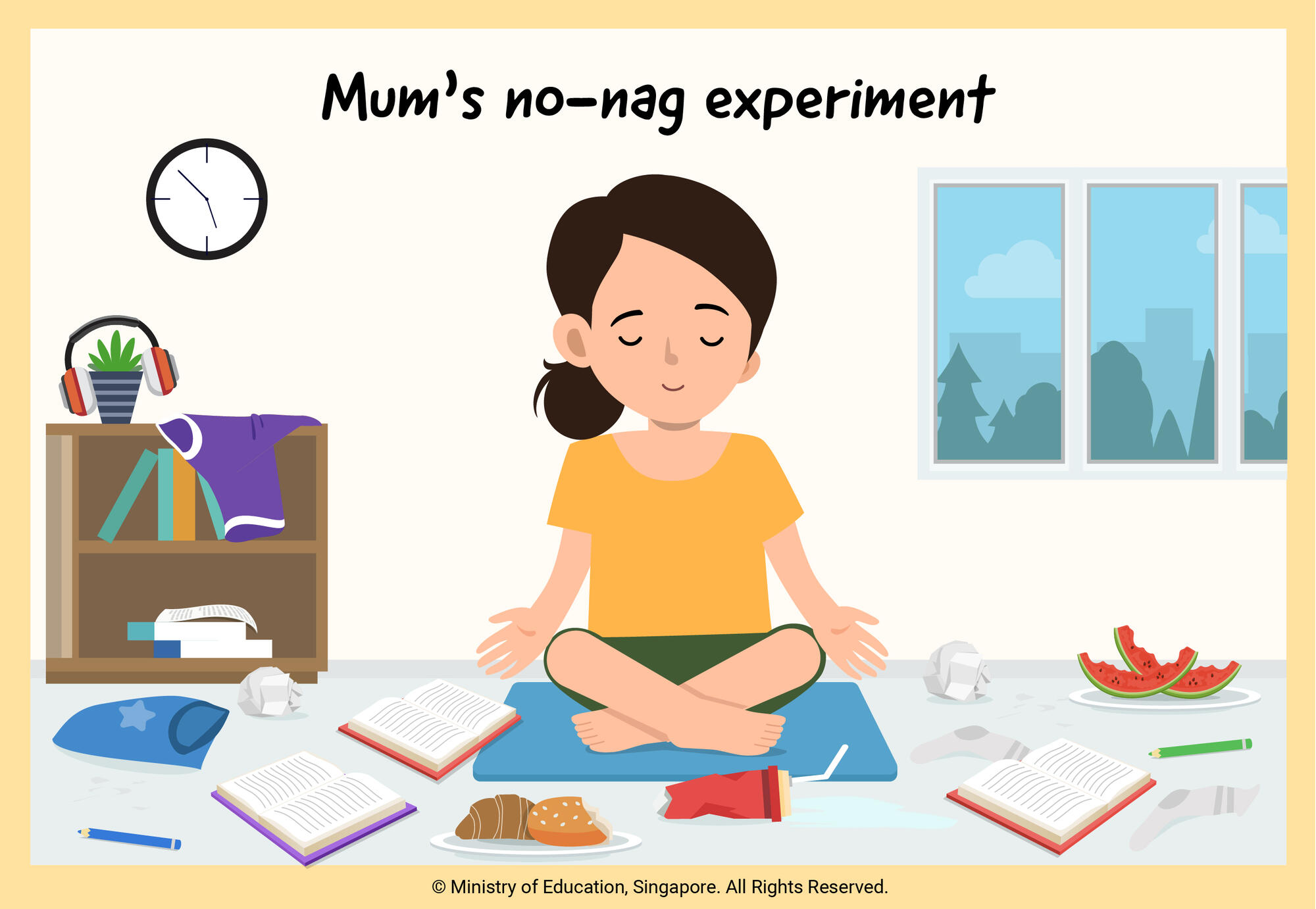What happened when I stopped nagging my kids
01 Apr 2022

For two weeks, Tee Hun Ching forced herself to explore alternatives to sounding like a broken recorder… So, did chaos reign or did mummy realise that her reminders are not as indispensable as she believed? She shares the results of her experiment.
Communication with my two kids had taken on an unsettling pattern over the past year. Whenever I started stating something they should be doing or have done, they would cut me off with a sullen “I know”, drawing out the “ohhhh” bit to emphasise their annoyance. In fact, just calling their names sometimes was enough to provoke an irritated “Whaaat?”.
The ensuing exchanges usually ended in an unhappy impasse: I would tick them off about their “bad attitude” and they would accuse me of being “so annoying”. My standard retort – “I keep saying the same things because you keep not doing them, even though you keep saying you know” – would then be met with eye-rolling.
So as the new school year dawned, I told my kids – an increasingly assertive 14-year-old and his equally unyielding 11-year-old sister – that I would be trying a “no nag” approach for two weeks. Since they are old enough to know what needs to be done and when, I would tell them to do or not do something at most once. If my demands go unheeded, they would have to bear the consequences, which would vary according to the tasks or infractions.
“For instance, if I find you fiddling with your phone when you’re supposed to be doing your homework…” “You would buy me a new phone,” quipped my daughter before I could bore her with the familiar threat of confiscating their devices.
The experiment would reveal if they are really as sensible, disciplined and organised as they believe, or if my reminders are as indispensable as I think. After two weeks of exercising heroic restraint, this was what I learnt.
1. It’s liberating to quit nagging
The self-imposed ban on nagging has forced me to examine why I do it in the first place. We all think we nag our kids for their good. But I now realise that I go into mother-hen mode mainly for my own peace of mind. I’m a diehard planner who likes to get things done in advance. I hate having my stomach in knots when I cut things too close to the deadline.
Working from home has put them right on my radar and added to my mental load. When, say, a full hour after they get home from school and I see my kids still tapping away on their phones, my stress level starts to climb, and my mind goes into overdrive. If they keep procrastinating, they will have to stay up late to finish their work. If they finish their work late, they will go to bed late. If they go to bed late, they will be too tired to focus in class the next day. And, yikes, don’t get me started on all that screen time!
Before my little social experiment, I could verbalise this whole train of thought and get it off my chest. Badgering them thus served as an escape valve for the anxiety percolating within me. I want them to get certain things done so I don’t have to fret over them. But in doing so, I end up keeping track of things that should be their responsibilities. This “say it once if you must” policy puts the ball back in their court, where it belongs, and frees me from unnecessary mental and emotional labour.
So, despite having to bite my tongue many times, I must say the experience has been rather liberating. The onus is on them to remember what their obligations are and when they should be fulfilled, not on me to remind them to plan ahead. And if they miss a project deadline or slack off on revision, for example, it’s their grades and credibility that suffer, not mine. I need to be okay with that.
Now, whenever I feel the urge to nag rise within me, I remember the advice from sociologist and author Christine Carter, who wrote, “As hard as it might be for us to watch, our teenagers are going to make mistakes. When they do, our anxious over-involvement won’t help. Letting our kids become the primary decision-makers does not mean that we become permissive, indulgent or disengaged. It does mean that the quality – if not the quantity – of our support shifts. We give up our role as their chief of staff and become more like life coaches. We ask questions and provide emotional support.”
2. There are (better) alternatives to nagging
It should be obvious by now that nagging doesn’t work, yet it hasn’t stopped anyone from doing it. And even though we all hate being nagged, we justify it as well-meaning reminders when we do the nagging.
While reading a piece about how to stop nagging on the health news portal WebMD, a quote from marriage and family therapist Michele Weiner-Davis struck me: “It goes from a reminder to a nag when the person who is being reminded gets offended. How the behaviour gets labelled depends on how the person hears it, not on how the person who says it feels.”
That my intention matters zilch if what I say grates on my children’s nerves was a revelation to me – no wonder they simply tune me out. Nagging doesn’t work because the underlying message is: “You are not good enough.” As child psychologist Robert Myers put it: “Nagging is a way of finding fault, and it tends to wear people down instead of build them up.”
The relentless focus on what a person is not doing or not doing right breeds resentment, which then grows into resistance, even open defiance. Once, when I reminded my daughter to wash her water bottle that was still in her bag hours after she got back from school, she snapped: “You telling me repeatedly to do something makes me not want to do it even more.” Disabling my nagging switch gave me the bandwidth to step back and see that, as a tween who prides herself on being a self-starter, she felt infantilised by my carping.
Parenting experts advocate “catching good” instead – acknowledging children’s positive behaviours so as to reinforce them. This “virtuous circle” approach has been rather effective. For instance, after we praised our daughter for shelling prawns for everyone at a recent family dinner without being asked, we noticed that she has been more proactive in looking for ways to help out around the house.
On the flip side, for lapses in behaviour, experts advise spelling out expectations clearly, then implementing consequences rather than nag when they are not met. So, when I caught my son watching movies on a streaming platform on his laptop on the third day of this exercise instead of tackling his homework, I had him sign out of the account and promptly changed the password. He can no longer binge-watch his favourite shows at will (or in secret). Without me having to belabour the point, he knew his momentary lack of self-control had cost him this privilege.
3. I should pick my battles
The moratorium on nagging made me realise how many things I tend to cluck over – screen time, outdoor time, meal times, bedtimes, being on time. It forced me to pick my battles carefully so I don’t squander my hard-earned emotional credit with them. This means closing one eye when my son lounges on his bed after school in his sweat-stained uniform and socks for a good 20 minutes. I tell myself he deserves some time to decompress after a long day of sticking to rules and a routine at school.
Learning to back off has yielded unexpected dividends. One night, my son decided he would have dinner after completing his homework and emerged only at 10pm. The pre-experiment me would have harangued him on the ills of irregular meal times and poor time management. Instead, I offered to heat up his dinner and sat down with him while he ate. That led to a nice chat about the activities lined up for his CCA that week, and I was so glad I chose connection over correction that night.
But no nagging doesn’t mean not saying no or setting boundaries. Some things are non-negotiable – like safety. Later that week, my son happily planned a weekend cycling trip with friends that would see them ride from East Coast Park to West Coast Park. We were excited for him, but reminded him to wear his helmet. “No one wears a helmet. It’s stupid!” he countered. It was our only condition and if he chose not to comply, I said he would have to skip the ride. Saturday came and he reluctantly strapped on his helmet as he left the house.
Conclusion
Trusting my kids to do the right thing is far harder than simply telling them what to do. But by respecting their autonomy and giving them a sense of agency, I would be helping them to build confidence and master self-efficacy. They may not always do things according to my schedule or preference – my son’s idea of a tidy room is very different from mine – but they do make an effort on things that they know are important for them or to me. Partial victories are good enough for me.
So is our home now a nag-free haven? Of course not. But now that I’ve been forced to explore alternatives to sounding like a broken recorder, I’m less likely to default to nagging mode. Asked to assess my performance so far, my daughter was surprisingly charitable: “You are not as annoying as before.”
Tee Hun Ching, mother of two, is a copy editor.

.jpg)
.jpg)
.jpg)
.jpg)
